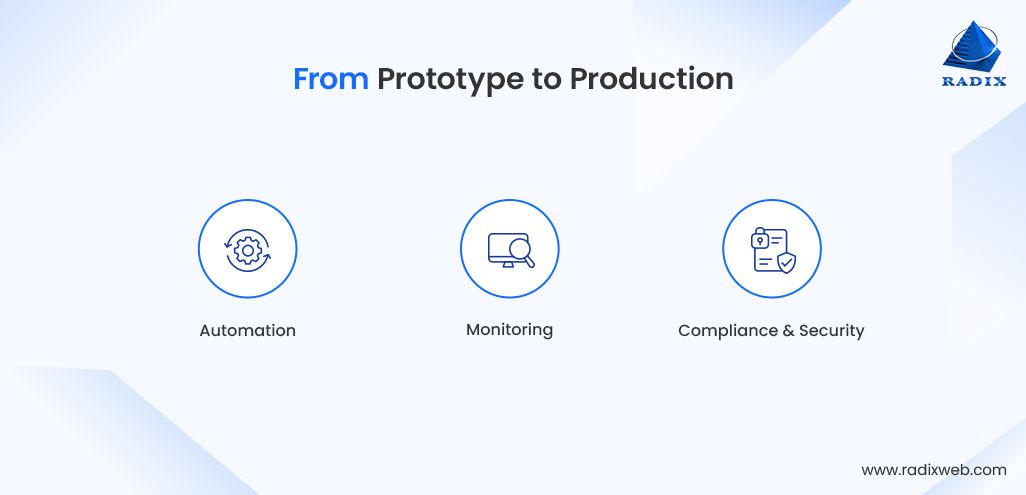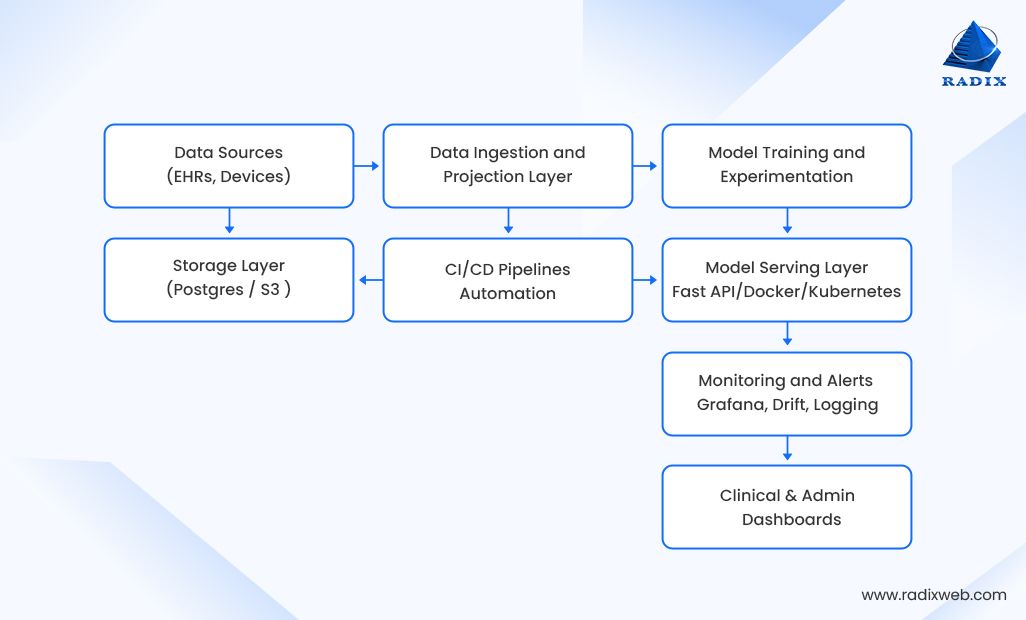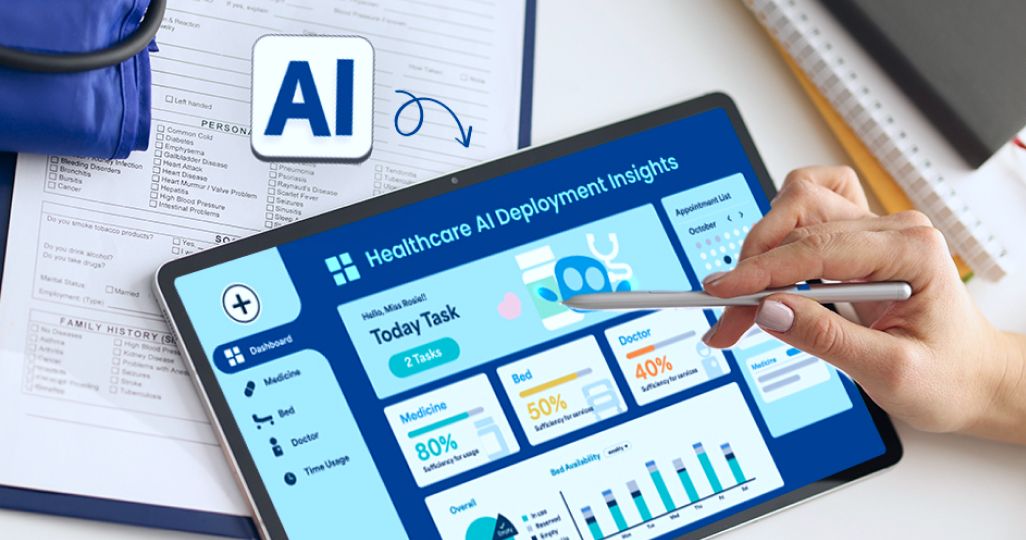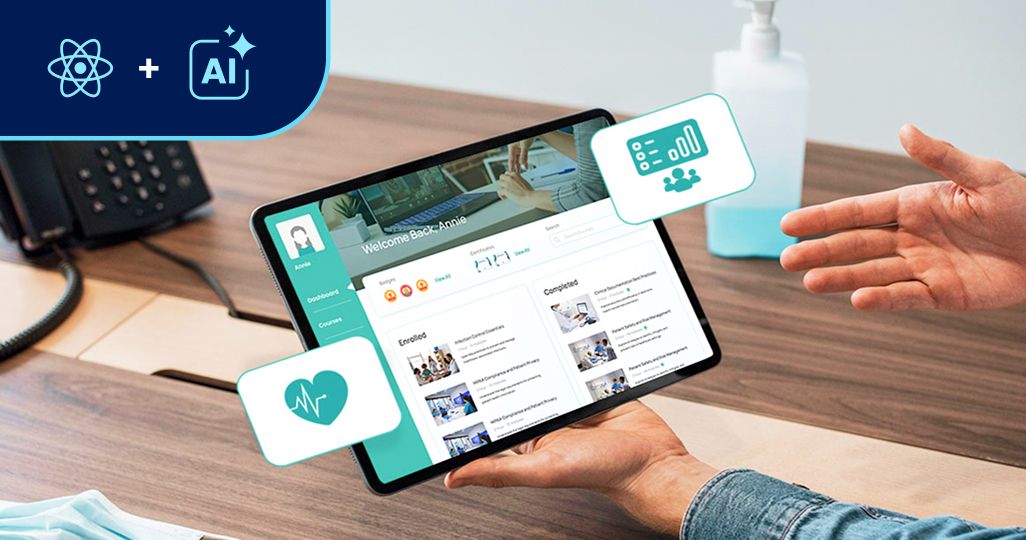
Discover what’s next for AI in healthcare in 2026 - Get Access to the Full Report
Healthcare organizations increasingly rely on Artificial Intelligence for various tasks. Yet, AI initiatives stall after the prototype stage due to fragmented systems, compliance requirements, and limited technical bandwidth.
Our client, a multi-hospital network in the USA, faced exactly this problem. They developed an AI model for predicting patient deterioration, which performed well in pilots. But the AI MVP lacked the infrastructure to deploy, monitor, and scale it safely. The goal of our engagement with them was to accelerate healthcare AI deployment while maintaining clinical accuracy and regulatory compliance.
Over 70% of AI initiatives fail to scale beyond pilots. Reasons include the lack of production-ready pipelines and monitoring capabilities.
Why the AI Healthcare MVP Wasn’t Enough
Our client came to us with an AI prototype that had the potential to transform healthcare and promised results in controlled tests. Yet, they were unable to move from a healthcare MVP to a full-scale product. This inability exposed several operational and technical challenges related to machine learning in healthcare, which we helped solve.
Hospitals are complex ecosystems with peculiarities like:
- Patient data is distributed across multiple systems
- Clinical workflows are tightly regulated
- Downtime is simply not acceptable.
The healthcare MVP lacked the architecture and integration capabilities needed for real-world application. The key limitations were:
Manual deployment processes
Each time the model needed updates, data scientists had to intervene, which created delays and increased the chance of human error.
No continuous monitoring
There was no way to ensure healthcare AI model monitoring and see how the model performed in real-time, identify model drift, or ensure prediction accuracy.
Data silos and inconsistent formats
The hospital stored information across multiple EHR systems, making data ingestion and preprocessing difficult.
Limited reproducibility
Without standardized pipelines, retraining or updating models required ad-hoc interventions, making audits and regulatory compliance cumbersome.
Scalability constraints
The healthcare MVP could not handle concurrent usage across multiple hospital sites, which became a critical bottleneck as the network expanded.
Generic AI tools and cloud-based solutions promised some convenience but were not tailored for the security, compliance, and operational demands of the healthcare industry. A custom solution was the need of the hour.
The Journey from Prototype to Production-Ready ML Ops
To address these challenges of machine learning in healthcare, we designed a comprehensive ML Ops framework tailored to the client’s healthcare network. The aim was to transition AI models from isolated prototypes into robust, automated, and scalable systems that integrate seamlessly with hospital operations. This approach focused on three pillars:

1. Automation
We implemented CI/CD pipelines for model deployment, allowing AI models to be updated automatically without disrupting workflows.
2. Monitoring
Real-time monitoring dashboards provided visibility into model performance, which helped detect prediction drift, measure accuracy, and trigger retraining when needed.
3. Compliance & Security
All pipelines and data handling processes were designed with HIPAA compliance at their core. Role-based access, encrypted storage, and end-to-end logging ensured patient data remained secure, while creating audit-ready workflows.
With the resulting ML Ops infrastructure, models could be deployed rapidly across multiple hospital sites, retrained automatically, and monitored continuously.
How We Engineered the ML Ops System: The Nitty Gritty
Our engineering process was guided by a clear principle: AI models must work for clinicians, not the other way around. Every component of the system was designed to integrate into existing hospital workflows, minimize friction, and maintain compliance.
Step 1: Understanding Client Requirements
Before starting, we spoke to the clinical staff, IT teams, and administrators to map out workflows, data availability, and operational constraints. Their requirements highlighted crucial points:
- AI models needed to be accessible across 10+ hospital sites with minimal downtime.
- Each model required audit trails and reproducibility to satisfy regulatory scrutiny.
- Data ingestion pipelines had to handle multiple EHR formats without error.
- Clinical dashboards had to be intuitive, giving staff actionable insights rather than raw outputs.
- System updates had to be automated yet supervised, preserving human oversight.
Step 2: Choosing the Right Tech Stack
The tech stack was carefully selected to balance scalability, reproducibility, and integration capabilities:
- Python & TensorFlow: To build, retrain, and deploy AI models. TensorFlow’s ecosystem enabled flexible experimentation while supporting production-ready pipelines.
- FastAPI: Lightweight APIs to serve AI models efficiently to hospital systems.
- Docker & Kubernetes: Containerization and orchestration ensured consistent environments across all sites, allowed rolling updates without downtime, and simplified scaling.
- PostgreSQL & S3: Structured storage for patient data, model artifacts, and versioned datasets, with encrypted storage for security.
- Grafana: Dashboards for real-time visibility for healthcare AI model monitoring, infrastructure health, and drift alerts

This stack allowed us to create a solution that could grow with the healthcare network.
Challenges and How We Overcame Them
Transitioning from the MVP to ML Ops in a healthcare brought unique technical and operational challenges:
Fragmented Data Sources Across Hospitals
Each hospital used different EHR systems and data formats. We built a secure, HIPAA-aligned data processing environment with pseudonymized patient data to enable cross-hospital analytics without exposing sensitive PHI.
Real-Time Predictions Under High Stakes
Clinical decisions often have life-or-death consequences. We implemented validation pipelines and canary deployments to ensure only rigorously tested models reached live environments, preventing errors.
Continuous Monitoring and Model Drift
Healthcare data evolves constantly, which can degrade model performance over time. Custom TensorFlow-based scripts monitored model drift and generated metrics visualized through Grafana dashboards.
Minimizing Downtime
To minimize system downtimes, we used Kubernetes rolling updates and containerized models which enabled 0-downtime deployment.
Clinician Adoption and Trust
Artificial Intelligence is only useful if clinicians trust it. So, we designed dashboards with clear visual explanations, confidence scores, and historical context, making AI insights transparent and actionable.
Through this careful combination of technology and process, we delivered a solution that accelerated healthcare AI deployment and empowered staff to trust and use AI in their daily workflows.
Driving Results That Mattered
The healthcare ML Ops platform transformed the client’s AI initiatives from a fragile, isolated MVP development into a production-ready ecosystem capable of scaling across their entire hospital network. Within six months of deployment, the platform delivered measurable, high-impact results:
- Deployment time went from 8 weeks to just 2 days with the automated CI/CD and containerized deployments.
- Real-time AI insights enabled across 10+ hospital sites
- Model accuracy improved by 12% with automated retraining, continuous monitoring, and feedback loops.
- 100% audit-ready compliance achieved with HIPAA-aligned pipelines and structured logging.
- 0 downtime scalability achieved via Kubernetes orchestration, ensuring uninterrupted access to enterprise AI in healthcare services.
Lessons Learned and Strategic Takeaways
The journey from MVP to full healthcare ML Ops deployment provided several insights for healthcare organizations looking to operationalize AI:
- Early prototypes validate ideas but need ML Ops for scalability, automation, and sustainability.
- CI/CD pipelines and containerization cut manual effort and enable rapid, disruption-free AI updates.
- Transparent dashboards and interpretable predictions keep clinicians in control and drive trust in AI.
Deploying enterprise AI in healthcare is not just a technical challenge, but an operational and cultural transformation. When done thoughtfully, as in this case, healthcare ML Ops allows hospitals to scale innovation, improve patient outcomes, and empower staff with actionable insights.
At Radixweb, we’ve built similar data, AI and ML solutions for other highly regulated sectors including FinTech and InsurTech too. Across all these projects, our focus has always been on trust, reproducibility, and driving measurable outcomes.
So, if you are looking for a way to scale AI pilots in your organization, schedule a no-obligation, strategy session with our experts to get started with accelerated healthcare AI deployment.
Talk to the team that turns complex ideas into outcomes.





